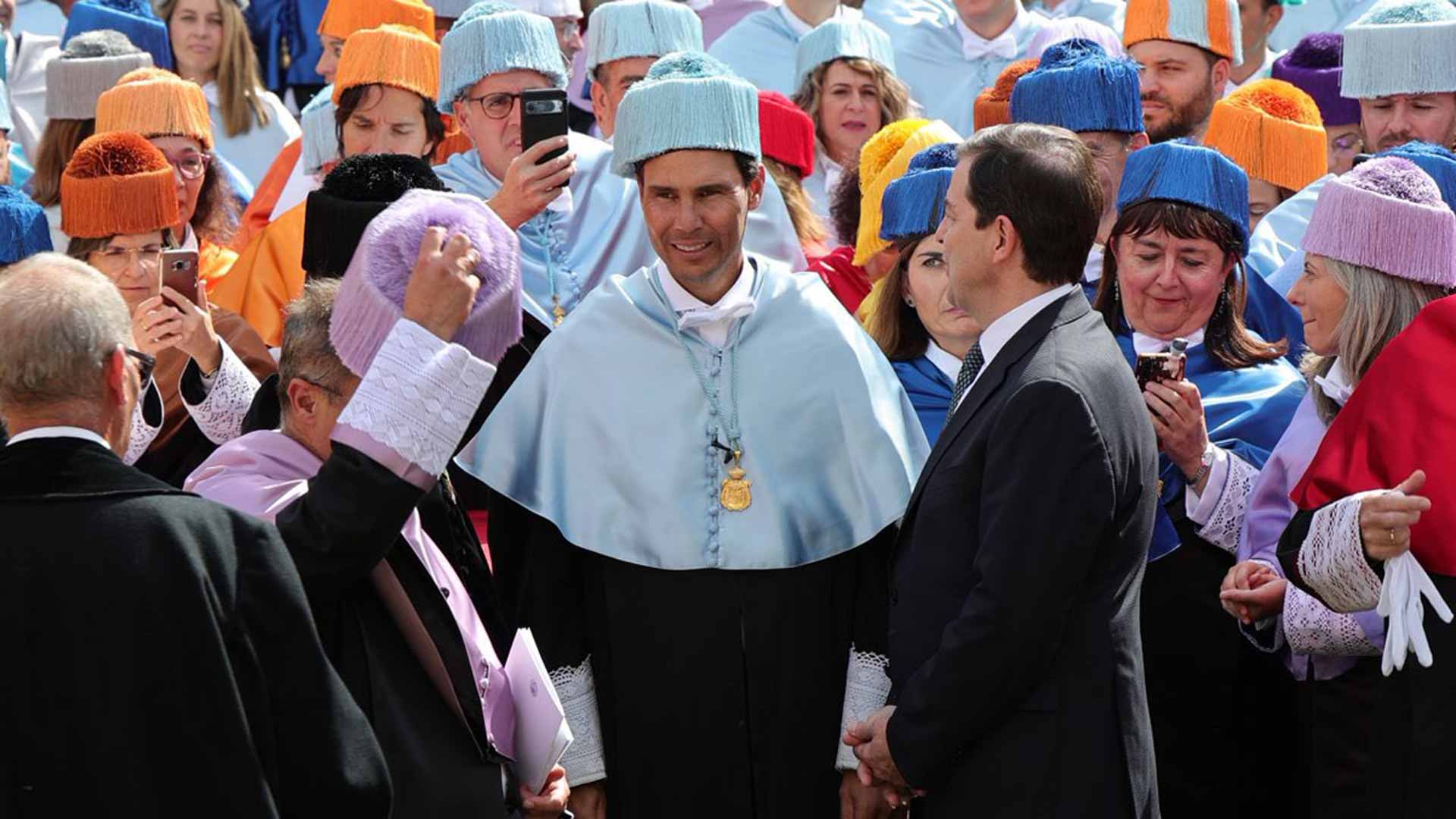

Throughout more than 20 seasons on the ATP Tour, Rafael Nadal forged a legendary career that included countless titles, records and landmark achievements. Now, off the court, the 22-time major champion continues to accumulate honours.
On Friday, Nadal was made doctor honoris causa by the University of Salamanca, becoming the first athlete the institution has bestowed the honour upon.
Donning a blue mortarboard, Nadal took an oath before the University Senate and received the medal that incorporates him into the Official Association of Doctoral Degrees of the University of Salamanca. The Spaniard gave a speech to the assembly hall in a ceremony that was attended by his wife Mery Perello, his parents Sebastian and Ana Maria, and his sister Maribel.
“It makes me so proud and grateful to receive the title of Honoris Causa from the oldest University in Spain and one of the oldest in the world; a place where, since the eighteenth century, humanism, critical thinking and intellectual freedom have illuminated the whole of humanity,” he began.
“As you all know, I did not follow a traditional academic education like most of you here; my education was different.
Nadal referred to his journey to becoming a professional tennis player. The Spaniard said: “My life was played out at tournaments and on tennis courts, travelling the five continents, competing and learning from the sport and from the experiences that came with all of that. Therefore, this recognition is not only a privilege for me, it is also a demonstration of respect for sport and what it represents to society.”
The former No. 1 in the PIF ATP Rankings set himself apart not only because of his competitive nature and ability to enjoy so much success throughout his professional career, but also because of his exemplary behaviour on and off the court. Nadal spoke of sport as a school of life.
“Ever since I was a boy, sport has been my own college and, in some ways, my own university. What I learned on the courts has always been with me, both in tennis and away from it. Sport taught me the value of discipline. You get nothing without daily hard work, without commitment and without taking care of the smaller details,” he said.
“Sport also taught me not to feel that I am better than anyone, because in competitions and in tournaments, as in life, nobody wins every time."
Continuing with the theme of education, Nadal spoke of a lesson he learned when he was a boy: “In 2002, when I was still a teenager, I was very excited about a particular goal; to play in the junior Roland Garros tournament for the first time. At the time, I already had some ATP points, I’d played in international tournaments and I thought that event was a great chance to compete on one of the most emblematic stages in my sport. Imagine a 15-year-old’s excitement at playing in Paris.
“However, my parents told me I could not play, because it was during exam season. For me, at 15, it was very difficult to understand. Despite my disappointment, my parents were not to be moved and in the end, I didn’t play in the tournament. With time, I learned that the decision was a great lesson and now I thank them because they helped me finish my compulsory education and they taught me that no goal comes before values and education.”
Nadal’s visit to the city of Salamanca aroused great expectations from the early hours of the morning, when hundreds of people began to gather near the university in the hope of an opportunity to get a glimpse of the Spanish legend.
The honour granted by the University of Salamanca follows others to be bestowed upon the tennis icon, such as the Prince of Asturias Award for Sport in 2008, the Royal Order of Sports Merit, the Medal of Merit in Labour and the National Sports Award, which he has won several times.
Editor's Note: This story was translated from ATPTour.com/es.